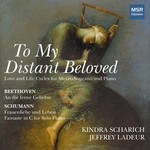|
Back
10/12/2020
“To My Distant Beloved”
Robert Schumann: Frauenliebe und -leben, opus 42 – Fantasie in C major, opus 17
Ludwig van Beethoven: An die ferne Geliebte, opus 98
Kindra Scharich (mezzo-soprano), Jeffrey LaDeur (piano)
Recording: St. Stephen’s Episcopal Church, Belvedere, Tiburon, California (February 18-20, 2019 – 74’10
MSR Classics MS1762 – Booklet in English (lyrics in German and English)

   
Beethoven and Schumann, two of the fathers of the German Lied, are represented in songs of separation and lament in “To My Distant Beloved: Love and Life Cycles for Mezzo-Soprano [Kindra Scharich] and Piano [Jeffrey LaDeur].”
At the heart of this new release is Beethoven’s An die ferne Geliebte, opus 98, composed in 1816 to lyrics by a young lawyer of the composer’s acquaintance, Alois Jeitteles. By 1816, most of Beethoven’s “Immortal Beloved”-type infatuations had run their course, and his attention was now focused on raising his nephew, Karl, for whom he had won custody early that year. It was not a particularly productive time for the composer, nor for Nature itself which endured the infamous “Year without a Summer”, a phase of climate change perhaps triggered by the Tambora volcanic eruption the previous year.
The cycle consists of six songs, sung tenderly by Scharich in a pleasing middle range, expressing the poet’s plaintive longing for the dear one now so far away. Each verse paints a picture of a romanticized nature where grey mists rise from blue hills, and gentle breezes bring memories of the distant beloved to mind. Scharich responds warmly to each change of phrase with delicate vibrato and a sweet tone that is a joy to hear. LaDeur’s accompaniment is both responsive to Scharich’s interpretation and musically imaginative.
The album opens with Robert Schumann’s Frauenliebe und -leben, opus 42, from 1840, a setting of a rather peculiar array of poems by Adelbert von Chamisso, a German poet and botanist famous for a story about a man who sold his own shadow. The lyrics, so inexplicably appealing to Schumann, provide a woman’s description of falling in love with and marrying the man of her dreams, only to suffer the first pangs of marital discord. Schumann composed this work in one of the pivotal creative years of his life.
In 1840 he married the composer and pianist Clara Wieck (after an acrimonious court battle with her controlling father), and branched out into symphonic writing. It was also the year in which he composed what is arguably his greatest song cycle, Dichterliebe.
As a harbinger of Schumann’s great works to come, Frauenliebe und -leben is instructive and revealing, though I cannot for the life of me understand what value this clichéd view of women’s lives held for him. I suppose just to recognize that women did have lives and feelings was a kind of victory in the earliest years of feminism. Today, this would be stoutly put down as cultural misappropriation.
Ironically, the story of this cycle foreshadows much of Wieck’s own life, as she succumbed to Schumann’s charm, imagined a life of wedded bliss only to wind up having eight children, cutting short her musical career and tending a husband who developed mental illness and died at an early age. Despite these issues, Scharich and LaDeur weave together their respective voices with skill and emotional engagement, sometimes bright and cheery, other times wistful and forlorn.
The album concludes with Schumann’s Fantasie in C major, opus 17, for solo piano. This is a rather lengthy work, taking up nearly half the album. LaDeur’s playing is lyrical, bringing a different voice to each of the three movements and an emotional richness to the third. I would have preferred a shorter selection, though, and the addition of another “distant lover” Lied, An die Entfernte, lyrics by Goethe, music by the third member of the art song trinity, Franz Schubert. Though only around three minutes in length, this song would bring a sense of completion and finality to an otherwise excellent recording of Romantic miniatures.
Linda Holt
|